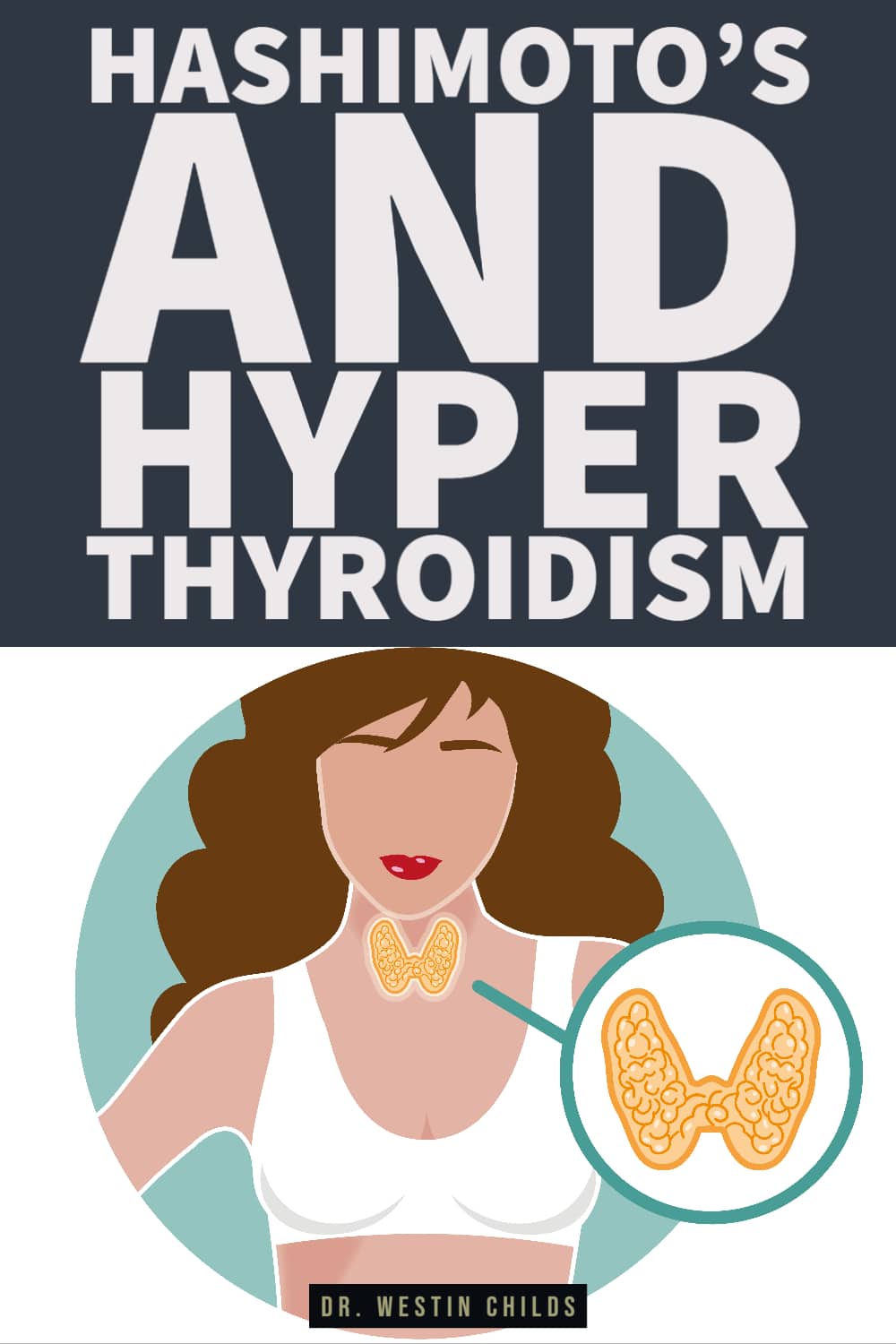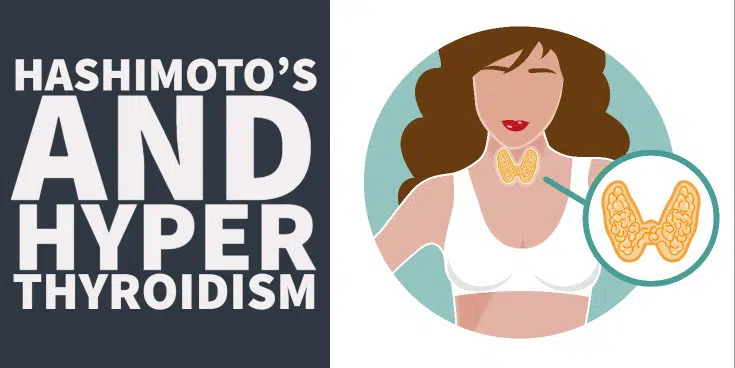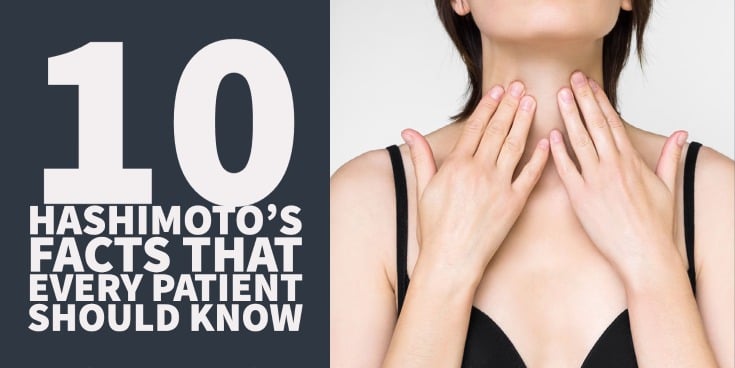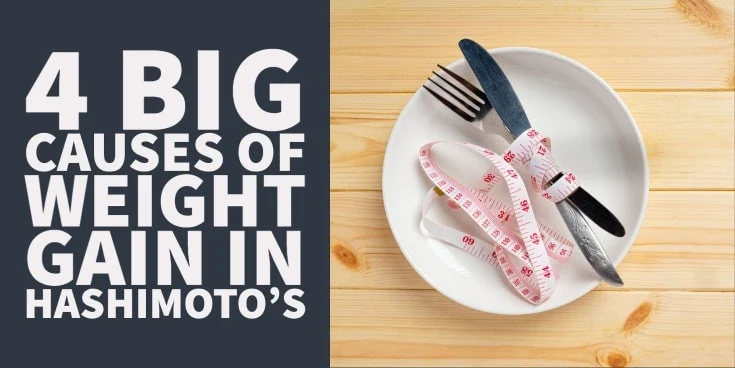Most people, doctors included, think about Hashimoto’s as a disease that results in hypothyroidism or low thyroid function.
And while that is true, it isn’t the whole story.
Can patients with Hashimoto’s thyroiditis also end up with hyperthyroidism?
The answer is yes.
In fact, there are several ways that it can happen and it’s not as rare as you might think.
And this hyperthyroid state can result in a lot of confusion for patients who have Hashimoto’s thyroiditis and are expecting to have low thyroid.
For these reasons, let’s discuss how Hashimoto’s can lead to hyperthyroidism and how patients with Hashimoto’s may end up with an overactive thyroid.
Today you will learn:
- How Hashimoto’s can result in hyperthyroidism
- How and why your thyroid symptoms can fluctuate if you have Hashimoto’s
- More information on the double diagnosis of Hashimoto’s and Graves’ disease
- The role that thyroid medication plays in your thyroid status
- And much more…
DOWNLOAD FREE RESOURCES
Foods to Avoid if you Have Thyroid Problems:
I’ve found that these 10 foods cause the most problems for thyroid patients. Learn which foods you should avoid if you have thyroid disease of any type.
The Complete List of Thyroid Lab tests:
The list includes optimal ranges, normal ranges, and the complete list of tests you need to diagnose and manage thyroid disease correctly!
How Hashimoto’s Can Cause Hyperthyroidism
Let me first start off by saying that most of the time Hashimoto’s does result in hypothyroidism or low thyroid function.
The normal route that most patients with Hashimoto’s take looks something like this:
- Step 1: Something sparks the creation of thyroid antibodies from your immune system which target proteins found inside of the thyroid gland (this could be due to genetics (1), the environment (2), infections, nutrient deficiencies (3), or many other factors).
- Step 2: The antibodies produced by your immune system target your thyroid gland and cause local inflammation.
- Step 3: White blood cells (from the immune system) infiltrate (4) thyroid gland tissue which slowly results in damage.
- Step 4: Over time this infiltration and inflammation result in permanent damage that causes decreased production of thyroid hormone.
- Step 5: This progressively gets worse until the thyroid gland can no longer produce thyroid hormone at all.
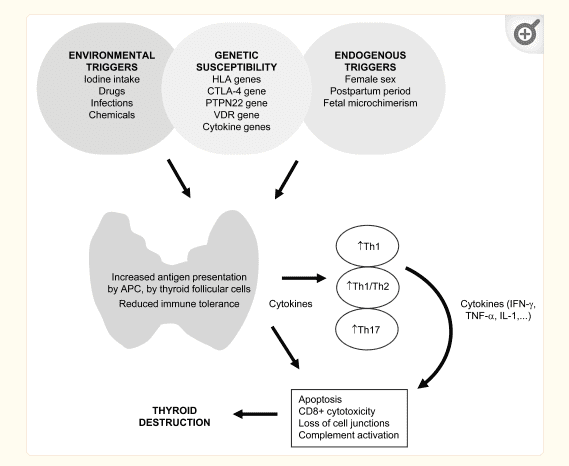
This is the normal progression for MOST patients who get Hashimoto’s but, as you probably are well aware, real life is not always this clean.
It’s hard to take a series of steps that should occur based on what has been read in a book and neatly apply it to everyone.
In the real world, the progression of Hashimoto’s isn’t always this clean and tidy.
This progression also doesn’t take into account treatments that patients may undergo to try and prevent their disease from getting worse.
With this in mind, let’s talk about some ways in which this progression changes and how these changes may result in hyperthyroidism.
#1. You May Go Through Hyperthyroid Phases
The first thing you need to understand is that many people with Hashimoto’s will experience fluctuations in thyroid function over time.
And this makes perfect sense if you think about it.
Sometimes your immune system will flare up and you will have more damage and inflammation and other times your body will be relatively under control and you won’t experience the same level of inflammation.
Imagine the ebbs and flows in your life, sometimes you are more stressed than others, sometimes you are getting more sleep than others, sometimes you may find yourself sick more frequently than others, and so on.
“Sleep deprivation makes a living body susceptible to many infectious agents. In the result, immune system of human body is altered by releasing immunomodulators in the response of infections as reported by various researchers.”
– Human Immune system during sleep (5)
Each of these will have an impact on your immune system and, therefore, the progression of your Hashimoto’s.
These fluctuations in immune function can be problematic because they can and do influence thyroid gland function.
Sometimes inflammation can lead to a DECREASE in thyroid hormone production (as mentioned above) and other times it may result in an INCREASE in thyroid hormone production.
Your thyroid gland is a tissue that is designed to create and store (6) thyroid hormones.
When it gets inflamed or damaged it may accidentally release too much thyroid hormone instead of too little.
When this happens you may experience a bout of hyperthyroidism.
“The organ system manifestations of Hashimoto thyroiditis are varied due to the nature of the disease. Initially, patients may have bouts of hyperthyroid symptoms, as the initial destruction of thyroid cells may lead to the increased release of thyroid hormone into the bloodstream.”
– Hashimoto’s Thyroiditis, et al (7)
Is this a rare occurrence?
Not exactly, it’s estimated that up to 10% of patients with Hashimoto’s will experience hyperthyroid episodes either on initial diagnosis or throughout the course of their disease.
When it happens and who will it happen to can be difficult to predict but one thing is for sure:
We know that it can and does occur.
And when it does it can be confusing for patients, especially those who are taking thyroid medication.
Imagine being someone taking thyroid medication like levothyroxine because your thyroid was low, only to experience hyperthyroid symptoms out of the blue because now it’s producing more thyroid hormone than it should.
This will necessitate changes to your thyroid medication and may even prompt a workup for additional autoimmune disease of the thyroid gland.
Understanding that this happens can prepare you for when it does and prevent unnecessary tests or a delay in diagnosis.
#2. You May Have a Double Diagnosis of Both Hashimoto’s and Graves’ Disease
This one is not quite as common as the first or the third but it can happen.
What if you end up with a double diagnosis of both Hashimoto’s thyroiditis and Graves’ disease?
If you aren’t familiar with Graves’ disease let me fill you in.
Graves’ disease is an autoimmune disease of the thyroid gland that results in hyperthyroidism.
Thyroid patients with Graves’ disease produce thyroid-stimulating immunoglobulin which binds to your thyroid gland and results in excess production of thyroid hormone.
The result? Hyperthyroidism.
This is pretty much the exact opposite of Hashimoto’s but these two disease states have a lot in common.

In fact, the same things that trigger Hashimoto’s can trigger Graves’ disease, and the same natural treatments for Hashimoto’s often work for Graves’ disease as well.
You can think of Graves’ disease and Hashimoto’s as two sides of the same coin.
They are slightly different but share a lot of similarities in their causes and treatment.
The main difference, of course, is that one typically results in hyperthyroidism and the other hypothyroidism.
But because they are so similar (8) in what can cause them, they may co-exist (9) together in some patients.
You might think it would be easy to differentiate these disease states based on checking for thyroid antibodies, right?
Unfortunately, it’s not quite that easy.
Patients with Graves’ disease can see elevations in both thyroglobulin antibodies as well as thyroid peroxidase antibodies (10).
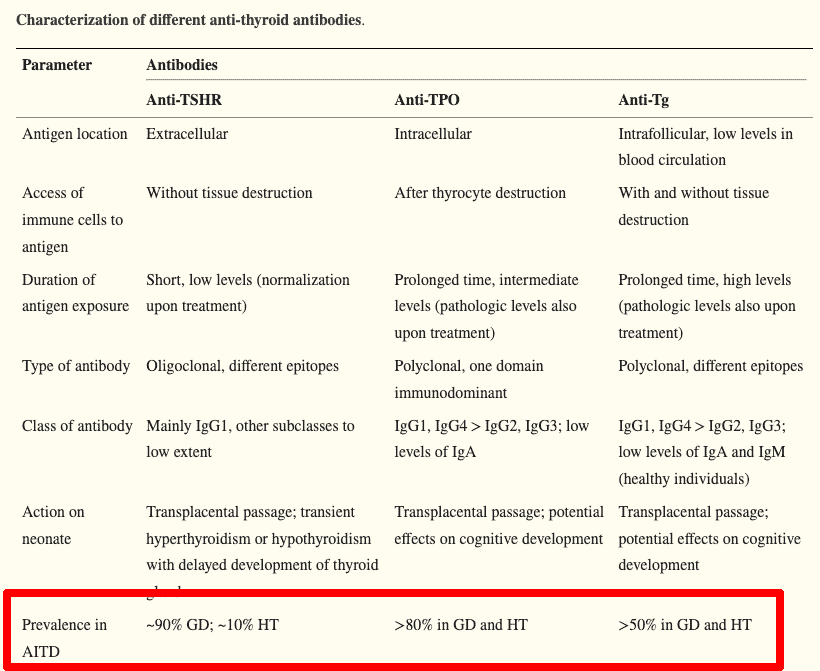
*Image key: AITD = autoimmune thyroid disease, GD = Graves’ disease, HT = Hashimoto’s thyroiditis.
This makes the diagnosis difficult to make at times.
Patients who find themselves with both conditions are often at a loss for what to do.
If you experience both autoimmune thyroid conditions then the answer is to always focus on whichever is more dominant.
It’s impossible for the same tissue to be both overstimulated and understimulated simultaneously by thyroid hormone.
You can use this information to figure out your thyroid status and whether or not you are mostly hypothyroid or mostly hyperthyroid.
Both conditions do have some overlap in symptoms, though, so this strategy doesn’t always work but it’s a great place to start.
Finally, if all else fails then the ace up your sleep should be focusing on your immune system.
Remember:
Both Graves’ disease and Hashimoto’s are considered autoimmune diseases which means they are first and foremost a problem with your immune system.
You don’t necessarily need to know what is happening with your thyroid to focus on treatments that balance your immune system and reduce inflammation.
The treatments that work for Hashimoto’s often work for Graves’ disease.
#3. You May Be Overmedicated with Thyroid Medication
Finally, the last way you can become hyperthyroid if you have Hashimoto’s is through the use of thyroid medication.
Thyroid medication, when dosed correctly, is supposed to bring balance to your thyroid function.
But it’s not hard to imagine a scenario where this goes wrong.
For the reasons I’ve already mentioned, your thyroid function can be a moving target based on fluctuations in your immune system and other factors.
Imagine trying to figure out how much thyroid medication you should be taking while your thyroid gland rotates between overproduction and underproduction of thyroid hormone.
Not so easy, right?
This is one of many reasons why patients with Hashimoto’s often do not always feel better even while taking their thyroid medication.
It’s not uncommon for them to either take too much or too little.
If you take too much then you can push yourself over into the realm of hyperthyroidism and if you take too little then your medication will have little if any effect.
And even without the moving target of thyroid function in Hashimoto’s, it turns out that doctors aren’t that great at dosing patients with thyroid medication anyway.
It’s estimated that up to 20% of thyroid patients taking thyroid medication are taking too much (11) at any given time.
And it’s also been estimated that up to 30% of thyroid patients who are taking thyroid medication don’t need to be on it (12).
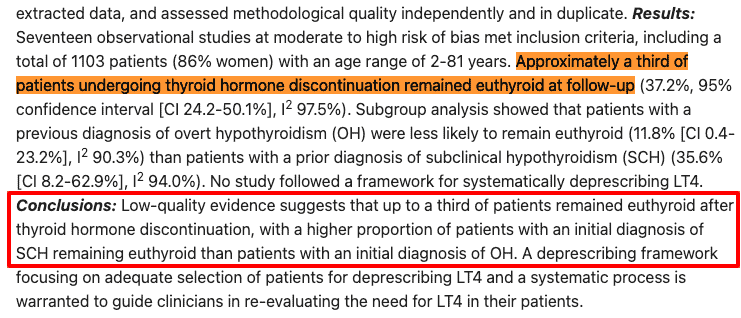
Those two stats should say a lot.
Doctors are routinely (though accidentally) overdosing patients and giving patients thyroid medication that don’t necessarily need it.
If you are someone with Hashimoto’s who is taking thyroid medication and you aren’t feeling where you want to be then one of the first places to look may be at your thyroid medication dose!
If you are experiencing hyperthyroid symptoms then dropping or lowering your dose may be the fix that you need.
In order to get this information, though, you will need to get a full thyroid lab panel.
It’s never a good idea to make changes to your thyroid medication without first checking these lab tests.
Symptoms of Hashimoto’s Hyperthyroidism
I mentioned above that one of the best ways to assess whether or not you are hyperthyroid is based on your symptoms.
And while this is a great way to qualitatively assess thyroid function, it’s not perfect.
It’s a great tool for thyroid patients that can help you determine if you need to see your doctor, though, which is why we still should talk about it.
The symptoms of hyperthyroidism are typically the exact opposite of those seen in hypothyroidism (with a few exceptions).
But in addition to these symptoms, patients with Hashimoto’s who also have hyperthyroidism may experience some immune-related symptoms as well.
Symptoms of hyperthyroidism in patients with Hashimoto’s may include:
- Weight loss
- Fatigue (also seen in hypothyroidism)
- Dry brittle hair (hair loss is also seen in hypothyroidism)
- Diarrhea
- Tremors
- Rapid heart rate
- Hot flashes
- Anxiety or panic attacks
- Warm sensation in the body
- Heat intolerance
- Insomnia
Immune-related symptoms may include:
- Headaches
- Feeling achy or flu-like
- Rashes (dermatitis or eczema)
- Enlargement of the thyroid gland or swelling of the neck
- Joint pain or muscle aches
- New allergies to foods or other products/chemicals
The immune-related symptoms are tied to thyroid function insofar as they impact inflammation in the thyroid gland but they are often completely different from the symptoms of hyperthyroidism or hypothyroidism.
The addition of these symptoms can often help you understand if your hyperthyroidism is caused by your own body or by thyroid medication.
If you experience hyperthyroid symptoms without immune-related symptoms then there’s a good chance your symptoms are related to your thyroid medication.
If you experience hyperthyroid symptoms with immune-related symptoms then there’s a good chance your symptoms are related to your own body causing a flush of thyroid hormone.
Again, these aren’t perfect but they can be used as a rough guideline.
Treating Hashimoto’s Hyperthyroidism
What can you do if you experience hyperthyroid symptoms and you have Hashimoto’s?
The first step is to try to figure out what caused the hyperthyroid state.
If you can nail down the cause then it will make treating the problem a lot easier.
For instance:
- If your hyperthyroidism is caused by your thyroid medication dose then reducing your dose is your next best step.
- If your hyperthyroidism is caused by fluctuations in thyroid function then focusing on reducing inflammation and reducing your thyroid medication dose temporarily (if you are taking any) is your next best step.
- If you have a combination of both Hashimoto’s and Graves’ disease then using natural therapies to cool down inflammation or medications like LDN is your next best step.
No matter what you do, though, make sure you get tested before you make any changes to your treatments or medication!
It may seem counterintuitive but there are plenty of times that your thyroid lab tests don’t always correlate with your clinical symptoms.
If that is the case then you need to do some more investigative work to figure out what is going on.
You might ultimately find that something like menopause is causing hyperthyroid-like symptoms which you are incorrectly attributing to your thyroid.
Believe me when I say that this sort of thing happens often!
You can prevent barking up the wrong tree by always checking your thyroid lab tests.
Wrapping it Up
Even though we think about Hashimoto’s as a disease that primarily causes hypothyroidism that isn’t always the case.
There are at least three different situations in which patients with Hashimoto’s can end up with hyperthyroid symptoms.
If you have Hashimoto’s then understanding how this occurs is important as it can help you get on the right treatment and avoid unnecessary delays in diagnosis.
Now I want to hear from you:
Do you have Hashimoto’s thyroiditis?
Have you experienced hyperthyroid symptoms before?
If so, do you know why?
Are you someone with a double diagnosis of Graves’ and Hashimoto’s?
Do you think your thyroid medication could be contributing to your hyperthyroid status?
Leave your questions or comments below!
Scientific References
#1. https://www.ncbi.nlm.nih.gov/pmc/articles/PMC3271310/
#2. https://www.ncbi.nlm.nih.gov/pmc/articles/PMC2935336/
#3. https://pubmed.ncbi.nlm.nih.gov/28290237/
#4. https://pubmed.ncbi.nlm.nih.gov/35140214/
#5. https://www.ncbi.nlm.nih.gov/pmc/articles/PMC5768894/
#6. https://www.ncbi.nlm.nih.gov/books/NBK500006/
#7. https://www.ncbi.nlm.nih.gov/pmc/articles/PMC5053048/
#8. https://pubmed.ncbi.nlm.nih.gov/17823263/
#9. https://www.ncbi.nlm.nih.gov/pmc/articles/PMC3603068/
#10. https://www.ncbi.nlm.nih.gov/pmc/articles/PMC5422478/
#11. https://www.ncbi.nlm.nih.gov/pmc/articles/PMC4560848/
#12. https://pubmed.ncbi.nlm.nih.gov/33161885/
